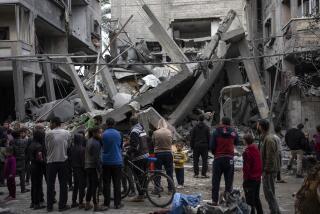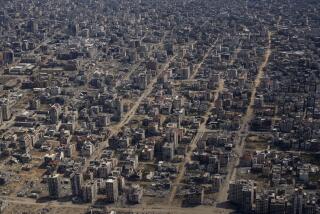U.N. Draft May Set Clock for Iran Sanctions
UNITED NATIONS — France introduced a draft resolution to the Security Council on Friday requiring Iran to suspend uranium enrichment by the end of August or face the possibility of sanctions.
The resolution, the product of negotiations among the U.N.’s five permanent Security Council members and Germany on the Tehran regime’s nuclear program, was expected to come up for a vote Monday.
The resolution is part of a long-running effort by the international community to push Iran to give up uranium enrichment. Iran has moved ahead with those activities, slowly but steadily expanding its enrichment capacity, according to the International Atomic Energy Agency, the U.N.’s nuclear watchdog.
The United States and its partners believe that Iran wants to perfect uranium-enrichment processes in order to make the highly enriched uranium needed for a bomb.
Iran says it wants the technology only for peaceful purposes such as generating electricity and that it plans to enrich uranium only to low levels.
In June, the five permanent members and Germany offered Iran economic incentives and technology, including several light-water reactors, in exchange for an immediate suspension of its uranium enrichment work and complete disclosure of all of its past nuclear activities. The United States agreed to be part of that deal and hold face-to-face discussions with Tehran along with the other countries.
But Iran put off responding to the offer. At first, its nuclear officials signaled they were open to the offer; later they described it as vague; and most recently they said they would not respond until late August. From the West’s standpoint, Tehran is out of time.
Under the resolution, Iran must suspend “all enrichment-related and reprocessing activities, including research and development.” The language would require Iran to shut down factories that manufacture equipment for uranium enrichment as well as halting the enrichment procedure.
The resolution also asks Mohamed ElBaradei, director-general of the IAEA, to report on whether Iran has suspended its nuclear activities and complied with IAEA requests for information about Tehran’s past nuclear-related activities.
The resolution also says that if Iran refuses to comply by Aug. 31, the Security Council will “adopt appropriate measures” under Article 41 of Chapter 7 of the U.N. Charter. Article 41 refers to economic or diplomatic sanctions but excludes force.
The resolution also asks Iran to allow comprehensive inspections of facilities not directly working on uranium enrichment.
Buried in the resolution’s language and in diplomats’ comments on the sidelines, however, were clear indications of the continuing differences among the six sponsors of the resolution. Russia disagrees with the United States and Europe’s willingness to push forward with sanctions, while the U.S., France and Britain express frustration with Iran’s delay in giving a response.
Vitaly Churkin, the Russian ambassador to the U.N., went out of his way to emphasize that the resolution did not “envision the introduction of sanctions.”
In contrast, U.S. Ambassador John R. Bolton said that if Iran failed to comply, “we will move to sanctions in the Security Council.”
More to Read
Sign up for Essential California
The most important California stories and recommendations in your inbox every morning.
You may occasionally receive promotional content from the Los Angeles Times.










